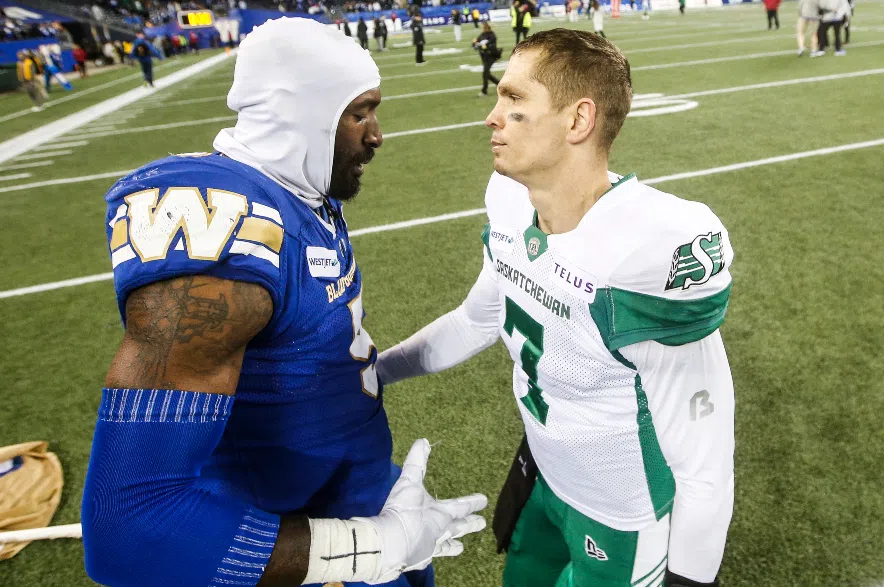OTTAWA — Prime Minister Justin Trudeau and NATO Secretary-General Jens Stoltenberg met for a private dinner at Rideau Cottage on Wednesday, capping off nine years as colleagues — and friends.
All of that is about to change though, as Stoltenberg’s twice-extended term leading the alliance is ending in October. It’s widely expected that Mark Rutte, the outgoing Dutch prime minister, will be chosen to take his place.
Trudeau will face voters by next fall, joining other key NATO allies who will have had elections by then including France, the United Kingdom and the United States.
The day after their dinner, Stoltenberg sat down with The Canadian Press in Ottawa to discuss his relationship with Canada, a place he says feels like home.
“That was a good dinner,” he proclaimed when asked about his evening with the prime minister.
“He’s a good friend and a good colleague.”
It’s a point he often likes to make. Among his many posts on social media about meetings with world leaders, he’s singled out Trudeau as a friend.
His visit to Ottawa this week in the middle of a heat wave may have had the Norwegian longing for a return to the Arctic, where he stopped in 2022 during his last trip to Canadian soil. He moved the interview to his personal room at the Chateau Laurier because it had better air conditioning.
But his fondness for his relationship with Trudeau occupies almost every answer, praising the prime minister for being a staunch supporter of Ukraine when he was first elected in 2015, a year after Russia annexed Crimea.
Stoltenberg even gave him leeway for not meeting the NATO defence spending target of two per cent of gross domestic product.
“One of the challenges in Canada is that in 2014, Canada’s defence spending was very low, so you have a long way to go,” he said.
Defence Minister Bill Blair had a similar talking point earlier in the week, pointing out that under the previous Conservative government, Canada was barely spending one per cent of GDP on defence.
This year, Canada is set to spend 1.37 per cent of GDP on defence, or $41 billion. There is growing criticism over the fact that it is the only ally that has not presented a plan to meet the spending target.
Stoltenberg has been the messenger for three U.S. presidents — Barack Obama, Donald Trump and now Joe Biden — who urged allies to spend more.
At a rally for his re-election this year, Trump said he would encourage Russia to “do whatever the hell they want” to any NATO member that doesn’t pay enough.
Asked how Canada should perceive those remarks, Stoltenberg brushed off Trump’s claims.
“We are in a very different place now when it comes to defence spending than we were when Donald Trump was president of the United States,” he said.
“The reality is that more and more allies are spending significantly more, and I’m confident that is something any U.S. president will be aware of.”
Defence spending across European allies and Canada was up nearly 18 per cent this year alone, Stoltenberg said during a speech at the White House on Monday — the biggest increase in decades. It’s expected that 23 of the 32 allies will meet the two per cent target this year.
And while there will likely be a wave of new leadership from key allies in the months ahead, possibly even in Canada, Stoltenberg said his expectation is that every single leader will uphold a strong NATO.
“We live in a more dangerous world with more global rivalry and it’s even more important now to stand together,” he said.
Stoltenberg has been visiting allies ahead of the NATO leaders’ summit in Washington, D.C., next month and to mark the alliance’s 75th anniversary.
He’s been going through each agenda and issues, but wouldn’t disclose any reassurances he received from Trudeau over dinner.
“It’s for Prime Minister Trudeau to announce anything on behalf of Canada, but Canada has been and will continue to be a staunch supporter of Ukraine,” he said.
Ukraine will be the biggest priority during the summit, as Russia’s war raises a threat of expanded conflict in Europe.
Trudeau has made Ukraine a highlight of his foreign policy since taking office, and that hasn’t gone unnoticed.
Canada has been there helping Ukraine even before the 2022 full-scale invasion, Stoltenberg said.
Since then, Canada has provided billions of dollars in aid to Ukraine, including battle tanks, F-16 pilot training, ammunition and other military equipment.
Canada also leads a battle group in Latvia, one of eight such multinational forces meant to deter and respond to threats posed by Russia. It’s set to scale up to a brigade-level force with the addition of troops from new ally Sweden.
Still, Stoltenberg will be asking for more when allies meet next month.
More money for Ukraine will be an agenda priority, after Stoltenberg recently proposed that NATO allies to contribute 40 billion euros a year, Blair said this week.
“Our support to Ukraine is not a charity, it is in our interest,” Stoltenberg said.
If Russia wins, then the lesson for Russian President Vladimir Putin and China’s President Xi Jinping “is that when they use military force and invade another country, they get what they want,” he said.
“The most expensive option for NATO allies is to allow Putin to win, because then we will need to invest even more in our defence.”
This report by The Canadian Press was first published June 21, 2024.
Mickey Djuric, The Canadian Press







